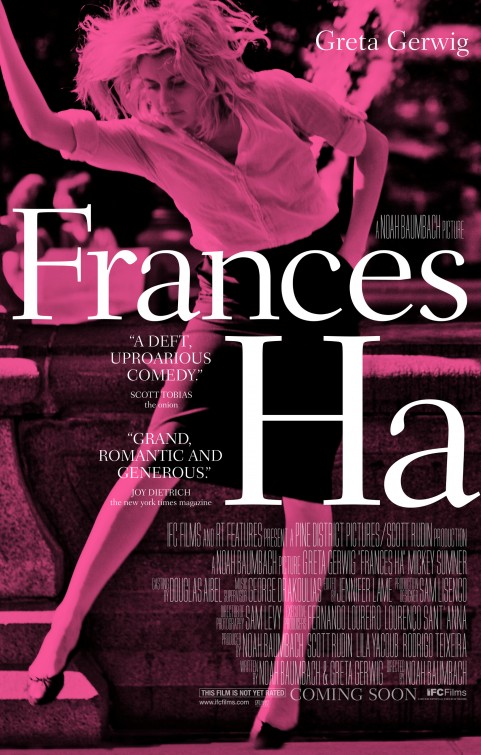Soundtracking: "Frances Ha"
 Wednesday, November 8, 2017 at 12:30PM
Wednesday, November 8, 2017 at 12:30PM Lady Bird is a hit, so Chris is dancing in the street with Greta Gerwig to Frances Ha's soundtrack!
 There aren’t many films that use music to capture a state of transition better than Frances Ha, particularly growing out of immature idealization. The film uses its heroine Frances’s addresses as chapter markers, but the flourishes of music notate her waning optimism and intensifying self-actualization. It’s like a variation on Woody Allen’s Gershwin obsession, but here it’s the character glamorizing her life rather than the film itself.
There aren’t many films that use music to capture a state of transition better than Frances Ha, particularly growing out of immature idealization. The film uses its heroine Frances’s addresses as chapter markers, but the flourishes of music notate her waning optimism and intensifying self-actualization. It’s like a variation on Woody Allen’s Gershwin obsession, but here it’s the character glamorizing her life rather than the film itself.
Music is an integral part of creating her internal fantasy. The twinkling, carefree instrumentals provide the lens with which we experience Frances’s world - or at least a more gilded version of how she envisions herself living in it. In tandem with the film’s precise editing and Greta Gerwig’s tremendous performance, the music choices make her everyday life a daydream that’s headed towards an inevitable collapse.
Haven't we all wanted this version of friendship, this kind of youth? Where even the inconveniences or struggles are charming? It’s an illusion we can be sink into, but never trust as a true depiction of her full reality. When music does exists in Ha’s real world, it’s either unheard (“aren’t these headphones the tits?”) or pale, like the hometown church service.
But that optimism runs out to hilarious effect as Hot Chocolate’s “Every 1’s A Winner” haunts Frances’s misguided trip to Paris. Baumbach would later use the same band to explore the delusion of another Gerwigian New Yorker in Mistress America, but here it's sequence specific. Like the rest of the film’s musical fantasy, this song sounds exactly like what we imagine from a spontaneous jaunt to Paris: glamorous fun in a blur of sexiness. The song stops and starts over the extended montage, as if Frances is listening to it on repeat in some effort to lift her mood.
Except each time it plays it only highlights to increasing distance between her rose-colored glasses and her depressive reality. The title alone is giddy in taunting Frances at her lowest, an added insult that we dance along as her isolation deepens. “Everyone’s a winner, baby, that’s the truth” - except for her. Frances Ha gets labeled as Baumbach’s sweetest film, but this sequence is as acerbic as he’s ever been.
It’s a long way off from how Baumbach employs David Bowie’s “Modern Love”, a disco musing on restless unintended stagnation in its own right:
There’s no sign of life
It’s just the power to charm
I’m lying in the rain
But I never wave bye-bye
But I try, I try
Like Frances’s failures, it should be depressing but its affectation of feeling is too convincing. It’s an exacting song choice because Bowie just wants us to dance along and Frances just wants to dance, literally and metaphorically. Plus, it’s a banger that can’t be denied - you should want to relent to the feeling here, and “Modern Love” demands you to move. That iconography of a twirling, leaping Gerwig hurtling herself through the New York City streets (minus any oncoming traffic) is as pure a distillation of feeling like you can overtake the world as your heart can handle. Of course, the real world crashes the party.
And she tries, she tries. When the song returns over the closing credits, it’s after another brisk bit of montage showing that she’s gotten her shit together. What’s doubly meaningful in the film’s reusing of the same music when Frances goes from mess to stable is how it tells us we don’t have to sacrifice our core self in order to grow up. The Frances that was led solely by the best version of her life can be equally as alive and sunnily disposed by the realest version too. And perhaps it’s more special because the real is much simpler.
Previous Soundtracking Favorites:
Meet Me In St. Louis
Big Mouth
Mistress America
A Mighty Wind
Young Adult
...all installments can be found here!



Reader Comments (4)
It was a great moment in the film when I first saw it until I realized it was an "homage" to the exact same scene in Carax's movie. Then it just lost its power...
@Me-I disagree. I thought the homage to Mauvais Sang worked as it played to both Frances desire to succeed as well as what Denis Lavant was trying to feel in his love for Juliette Binoche.
The music from that first scene is from a Truffaut film in Such a Gorgeous Kid Like Me which I love as it's just hilarious.
Nathaniel:
Hit. Ladies. Saorsie! Telephone!!
I am not sure about the Modern Love sequence. It feels too easy, specially when you consider Carax is not extremely popular even among film buffs.